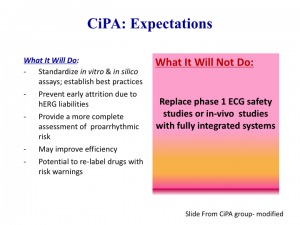 Dr Krishna Prasad, MHRA
Dr Krishna Prasad, MHRA
Proceedings from AHPPI’s conference on Risk Management in Early Phase Clinical Trials, 29 Oct 2015 (link).
Krishna reviewed the status quo pointing out that the regulations were a success in that no drugs having undergone E14 testing had to be withdrawn subsequent to receiving marketing approval. However, over 400 TQT studies have been conducted over the 10 years costing well in excess of £1bn whilst having a negative impact on drug development due to the premature discontinuation of promising drugs due to hERG effect or a QT signal. He suggested that many potentially good compounds might not have been evaluated in humans due to a hERG effect, a view that is shared by many.
He gave an example of an iQT study which was deemed adequate to assess the pro‑arrhythmic risk by both the FDA and EMA, but he also pointed out that this one precedent did not create a universally applicable standard a drug developer could rely on. He discussed whether CE analysis in early phase studies would provide adequate confidence in risk evaluation and labelling. In the absence of a TQT study, careful assessments of the limitations of the proposed alternatives are needed: are sufficient exposures achieved in SAD/MAD studies; have period and sequence effects in ascending dose studies been adequately considered; was there clear exposition of PK of parent and metabolites? He also flagged the operator dependency of modelling approaches which still needs to be addressed, raising the question “Would CE analysis in early phase provide confidence in risk evaluation and appropriately guide B:R evaluation and labelling?”

He suggested that CIPA will standardize in vitro and in silico assays and establish best practices. He expressed hope that this would prevent early attrition solely caused by a positive hERG test. CIPA will provide a more complete assessment of pro‑arrhythmic risk and may help to re‑label drugs with risk warnings. He cautioned that it will not replace phase 1 ECG safety studies or in-vivo studies with fully integrated systems, pointing out that at this point in time, for some cases, a TQT study might still be the most cost effective option! Early phase studies are still binary (yes or no) but will benefit from a more comprehensive non‑clinical background making the two approaches complementary.
Written by Dr Jörg Täubel, Richmond Pharmacology Limited. Jörg trained in clinical  pharmacology and has been a principal investigator since 1995, conducting studies in patients and healthy volunteers ranging from first time in man (FTIM) to later phase studies particularly in cardiology, neurology, and gastroenterology. He provides expert advice in cardiac safety assessments and ethnic comparison studies. Jörg is an honorary fellow at St George’s University and his academic research is focussed on the role of hyperglycaemia in relation to sudden cardiac death in Type I diabetic patients. He is a member of AHPPI and AGAH and the EUFEMED scientific committee.
pharmacology and has been a principal investigator since 1995, conducting studies in patients and healthy volunteers ranging from first time in man (FTIM) to later phase studies particularly in cardiology, neurology, and gastroenterology. He provides expert advice in cardiac safety assessments and ethnic comparison studies. Jörg is an honorary fellow at St George’s University and his academic research is focussed on the role of hyperglycaemia in relation to sudden cardiac death in Type I diabetic patients. He is a member of AHPPI and AGAH and the EUFEMED scientific committee.
